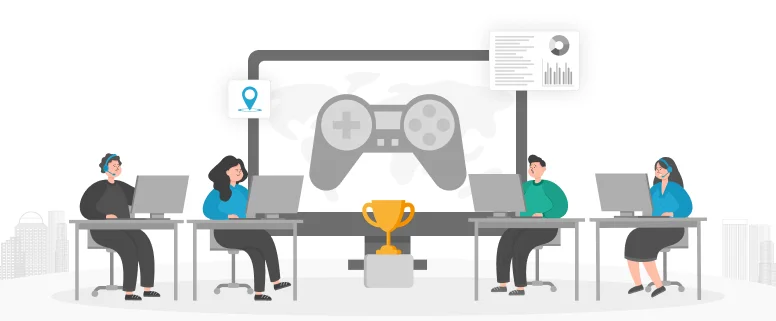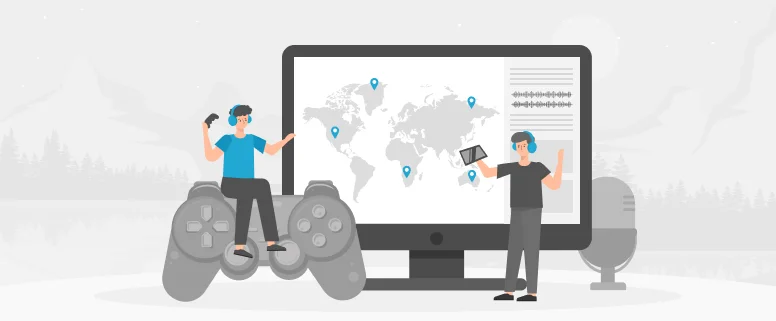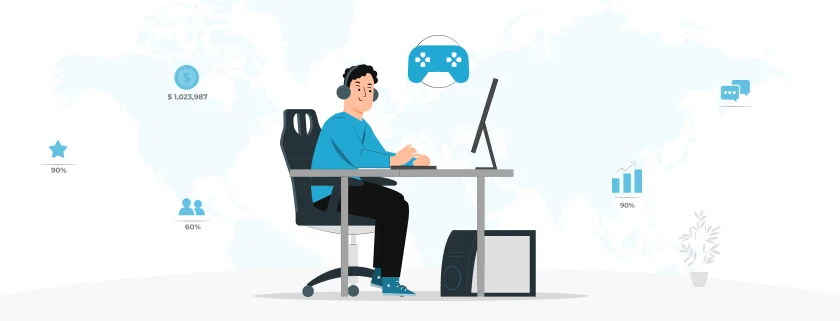The United Kingdom market is one of the most lucrative markets for the gaming industry. The number of people playing video games has increased tenfolds in the past several years. And amid the pandemic crisis, we have seen that the UK gaming industry experienced a lot of new users. Hence, it is the best time to localize your game for the UK market.
Now let’s start with a topic.
Understanding Video Game Localization
Video game Localization, in simple terms, is preparing your game to be playable and enjoyable for a player from another region or nationality. So, for example, taking a game that is only available in English and adjusting it so that it is easily understandable and enjoyable for a Japanese player or whatever nationality you want to target.
Differentiating Between Localization And Translation
Localization and translation are two terms that often get mixed up. So let’s also quickly look at the difference between those.
Translating is turning your text from one language to another; simple localization, on the other hand, is a much broader subject. But again, in simple terms, it’s about trying to make something understandable and enjoyable for another person in a different culture. This includes translation but can also include:
- Changing units of measurement.
- Switching a job to a more understandable one.
- Altogether removing some culturally sensitive subjects.
But let’s move on to some important questions you might have about localization. Should you localize your game for the UK market?
Let’s first take a look at the benefits and downsides of localization and then get back to this question.
Benefits of Localization In The UK Market
Let’s start with the benefits of localizing your game.
- Increase The Size of The Customer Pool
It will increase the size of your potential customer pool, essentially making it more likely that your game will sell well. If we look at the survey data online, we can see that 39% of users have English as their main language. And many of them reside in the UK. It’s important to consider as algorithms won’t even offer your game to those that don’t have one of the games’ supported languages included in their own languages.
By focusing on English, you are increasing the potential miscibility of your game.
- Increase Player Satisfaction
The second benefit of localization in the UK market is that it will increase player satisfaction as many players will now be able to play the game in a language they are most comfortable using.
Additionally, along with these two great benefits, there’s also one additional benefit that can give a huge boost to the chance of your game being successful and selling 1000s and 1000s of copies. Localizing your game will also increase the chance of your game going viral on Steam.
As a game designer, the primary advantage of localizing games is the increased visibility to a wider public and generating more money. However, it’s also beneficial to the players too. They are able to discover an entirely new world where characters use their own languages.
- Drives More Sales
Are you aware that gaming published in English is able to reach 25% of the world’s gaming market?
Since the Asia-Pacific region dominates this market, it is logical to consider ways of tapping into it. Therefore, focusing your efforts on markets where English is the dominant language could see an enormous increase in sales.
- Increases Downloads
It is a given that you’ll need to download more files in order to boost sales. To achieve that it is necessary to focus on the UK market. . Localizing your game can be the sole way to ensure that you play with more gamers across the global market.
The majority of games of the top 100 downloaded games on the App Store in the UK are available in English. However, even in European regions in which English proficiency is high games are still a preference for games in their own languages.
- Boosts User Experience Ratings
One of the most effective methods of improving the experience of users is by getting gamers to become absorbed and immersed in their minds and in the plot. A genuine experience such as this can’t be achieved when a player is battling through the game in a way that isn’t engaging. This is often the case when players don’t know the game’s language.
Nowadays, developers let gamers decide on the direction of their game and develop their own stories. UX can be seen as the most innovative aspect of developing and implementing a custom localization system that allows gamers to create their own narrative.
With many languages that you can cover as well, the more comfortable gamers will be playing your game in accordance with their cultural, linguistic, and cultural environment. Because in the UK market only 59 percent of the people speak the English language. Meanwhile, there is a vast population that consists of indigenous people. Hence, creating content in multiple languages would allow you to acquire a wider market share.
Localization Keeps You Competitive in a Tough Market
Strategies and reactions are the primary reasons behind localization in games. We’ve previously described the strategy approach, which involves identifying particular countries and languages you’re able to focus on. The other method of locally translates is reactive. You’ll need to find a way to stand out among the greater than 2.2 million apps on the App Store. That’s exactly why you must localize the game. And starting with the UK market is the right step.
It will save you from Embarrassing Situations
Professional localization helps reduce the chance of players misinterpreting the meaning in your sport. It’s not just about translating. It’s about replacing a word with another one that has the same meaning, however, it’s in a different language.
However, to translate your context, you require a professional. You’ll need someone who understands the jokes, slang, and references to the culture of the language you’re aiming at.
In the simplest sense, you’re changing your game to incorporate local influences such as date formats, music foods, holidays, and colors that are influenced by the local, social and cultural contexts of the target group.
Why You Wouldnt Want To Localize Your Game?
Now that we have you all hyped up and ready to localize your game. Let’s talk about why you might not want to localize your game. So why wouldn’t you want to localize your game?
Time Consuming
Well, simply because it takes time and money. Also, from the technical point of view, if your game is almost ready, and you’re thinking about localizing it, it can be a real challenge to get your game to support localization.
It is not something you can just quickly paste into your game. Your game needs to be built to support localization. That said it’s not really that hard to have your game support localization.
It’s definitely possible to modify your game to support localization, even after a game is already finished.
It just takes time. So how much time does it take?
Overall a single project clocks 1681 hours, out of these, 160 hours for localization. So that’s almost 10% of the whole project equal to a full month. If you break it down into normal eight-hour workdays, if you build your game from the start with localization in mind, it probably won’t take this long. But it’s still good to prepare for the possibility and likelihood that it’s going to take time.
Half of those hours are spent going through the whole game, changing every hard-coded string into a dynamic local as opposed string, and then ensuring that the translations look good in the game.
The other part is used for coordinating the translation work and adjusting the translations. Okay, so that’s time as one of the downsides.
Expensive
What about the other?
Localization takes money and can get very expensive, depending on your game. The prices can vary a lot based on the language barrier of translation, how complicated your text is, who you are interested in, and most importantly, how many words your text has.
If you don’t want to use money at all. There is also one other option that’s available to some and that is community translations. If your game has an active community, you could try and see if there are gamers who would like to translate your game for free, simply because they are excited to see the game in their own language.
Okay, so money and time were the biggest downsides.
Enjoyable
One other downside could also be playing your game in another language simply isn’t as enjoyable as playing in the main language. Maybe your game is full of cultural references that are impossible to localize and the game experience simply posts flat if there are missing for some games, that might be a big issue.
Some things are always lost in translation, and your message in the game might be altered, but many players will still enjoy playing it in their own language, despite the loss.
Why You Should Localize Your Video Game For the UK?
Let’s get back to the main question. Should you localize your video game?
Let’s rephrase it a bit to remove some subjectivity. Is it smart financially to localize your game?
It’s still hard to give a definite answer. But if you expect your game to sell well, even without localization, the answer is most likely yes. If you’re not sure if your game will sell at all, the answer is maybe or it depends. You will need to consider how many bullets your game has and how easy your game would be to localize. How much money and time would it take to localize your game?
What are your expected sales and can they make up for the cost? Do you have a platform with 500 words in total? That’s an easy yes, globalization. But if your game is a niche, story-based game with hundreds of 1000s of words, it might not be worthwhile to localize it. But generally, for your average India game, if you intend to make money with it, it’s probably worth localizing in the UK market.
Conclusion
In most cases, localization is very much worth it. Despite all the hours spend to enable it, the biggest impact for most video gamers will be observed in the UK region. Hence, do not waste your time deciding to penetrate the UK market or not, just go for it.



